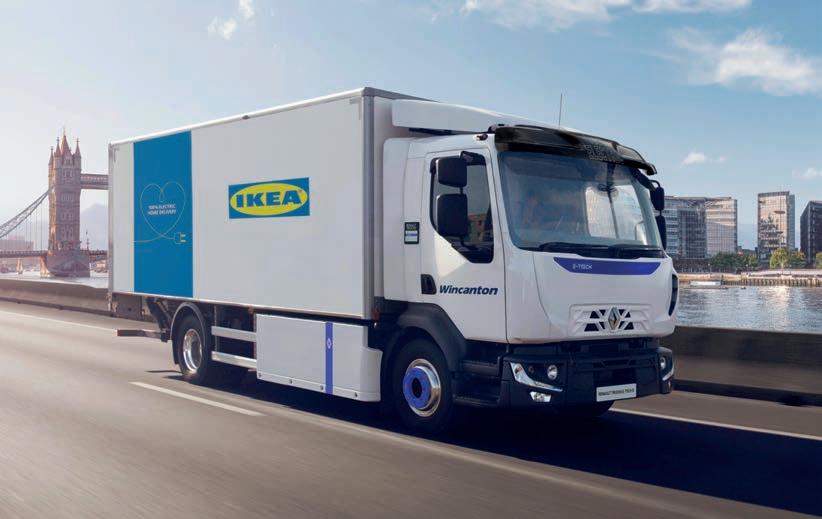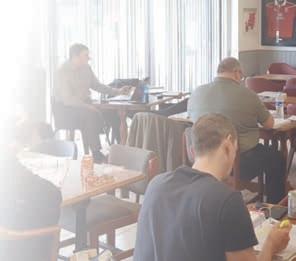
3 minute read
is no tomorrow with diesel’
We are disappointed that MT would publish such negative views on climate action at the same time as unprecedented heatwaves and devastating fires in Europe (and elsewhere), and as leading scientists as well as over 100 business leaders implored the UK government to accelerate action on climate.
Setting aside the unworthy swipes at vegans and the leading climate advocate Greta Thunberg, the article focuses on the challenges and costs of making the transition according to the timetable the government has set. The article also confuses arguments about toxic pollutant emissions and greenhouse gases, whilst suggesting countries other than the UK should tackle greenhouse gas emissions.
Advertisement
Yes, the commercial vehicle market is lagging progress under way in the decarbonisation of lighter vehicles and buses. But battery electric cars only began to make real headway around 2019 and now represent 17% of the new market. Electric vans have been a realistic option for less than three years but now comprise 6% of sales.
Electric HGVs can already be cost effective in some circumstances and we expect this will apply to a rapidly growing proportion of the fleet in the years to come. Well before 2035 lighter electric trucks are likely to be the default (cheapest overall cost) option for the majority of operators looking to replace vehicles. In addition, the demands of consumers and customers of hauliers are already putting decarbonisation at the centre of procurement, so anyone foolish enough to only consider long-term diesel operations could well find themselves out of business. For larger trucks, of course, the zero tailpipe emission regulations don’t come into force until 2040.
All the signs are that commercial vehicle operators will be able to make a cost-effective switch to zero emission vehicles by the planned deadlines, but we can’t afford to delay or listen to those who dissemble, or seek to delay the transition for whatever reason.
With media stoking the fires of climate deniers and net zero naysayers it would be easy to be taken in by the calls to delay action on decarbonisation and emissions reduction.
Even within the pages of MT, a former captain of the HGV industry has recently been railing against electric trucks – and in the process insulting operators, his own erstwhile customers.
Let’s hope the current management of the OEM concerned holds a different view, as its website now carries phrases like “eMobility is in our genes” and “with a clear strategy to drive technology transition towards the battery electric vehicle”.
Against this backdrop, it should come as no surprise if operators are confused and looking around for independent information and support they can trust.
In it for the long haul Road freight’s race to net zero is definitely a marathon not a sprint. To stretch that analogy further, I might suggest the race is actually a three-legged relay rather than an individual event.
Let me explain...
Taking the first step on your road to net zero needs collaboration and partnership, it needs you tied together with people who can help. A fleet review with the Energy Saving Trust could be a good start, supported by advice on quick wins to reduce fuel consumption from the Freight Portal (thefreightportal.org). During this first leg, you need to develop a clear plan for the rest of the race, positioning your changeovers to achieve the fastest time.
The first changeover may well be to a renewable fuel, supported by Zemo’s Renewable Fuels Guide and working closely with the fuel provider and OEM ensuring warranted vehicles. This second leg of our relay significantly accelerates your pace of decarbonisation, with 80% or more greenhouse gas reductions possible.
Getting closer with every step is the next changeover, where a series of zero-tailpipe-emission vehicles with low-carbon energy and the infrastructure to ‘fuel’ them await you. These resources will rejuvenate your pace once again as you approach the net zero finish line.
And, just as with athletics, covering the distance as a relay is faster than doing it alone – perhaps 16% faster if current 400m sprint world records are the benchmark.
Focus on decarbonisation
More and more we hear from both end customers and from shippers and corporates that they want and need to reduce their carbon footprint. Transport is invariably a primary target for this and is often one of the easiest to quantify from simple fuel consumption data.

Decarbonisation will remain in the spotlight of the corporate social responsibility agenda and, despite any doubts about policymakers’ resolve in the short term, individual consumers and companies will not back off from their focus because they understand the critical importance of tackling climate change.
At the start of your journey, you’re unlikely to be able to see the finish line or perhaps even feel confident you will ever reach it –just like in a marathon – but my advice is to remain focused on the objective and not get too distracted by all the background noise.
With the right equipment, fuel, support and – critically – resolve, we’ll all make it to the finish line and get the net zero medal!
n Andy Eastlake, CEO, Zemo Partnership







